First Feathers
You never forget the day you became a waterfowler
You never forget the day you became a waterfowler

By T. Edward Nickens, Illustrations by Gary Palmer
We left Biscuit behind. It was Jack's first duck hunt, and we had a swamp to cross in the dark and a couple of downed trees to pull the canoe over before we got to the good spot. There was no one with us and no one even within hollering distance. Leaving the dog at home seemed prudent. Looking back, that's the only thing I would have done differently.
Looking back, it was all nearly perfect. Jack was 10 years old, swimming in a pair of chest waders that would have held another Jack or two, swaddled in a man's camo jacket and a PFD cinched down tight. We crossed Mrs. Edie Pie's swamp with Jack in the bow of the canoe, his headlamp lighting the way. Then we hunkered down in front of a thick stand of young cypress trees, the water up to Jack's waist. He carried a hand-me-down 1953 Browning Auto-5. When a pair of wood ducks skittered in like wood ducks do, flying like the idea of a straight line never crossed their minds, I figured it would be another morning of "that's okay, buddy" and "we'll get the next ones."
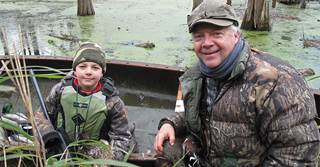
Nickens and his son, Jack, after a "nearly perfect" day in the swamp. Memories of first-duck experiences like this one last a lifetime.
Instead, Jack folded the first duck. We both knew before it hit the water that it was a woodie drake. I thought he might whoop loud enough to make the trees shake, but he never peeped. He just grabbed me around the waist in a tight hug I can still feel, his eyes on the water and on his very first duck. Biscuit would have loved it. But there would be more birds for Biscuit to love.
For young hunters, shooting a first duck or goose feels like passing through a portal into another world. It is both an accomplishment and a validation. At the same instant, you never want this feeling to pass, but having felt it, you're ready for the next bird, the next hunt, the next adventure.
HERE ARE THE STORIES OF FOUR MORE FIRSTS, AS SEEN THROUGH THE EYES OF PARENTS AND MENTORS AND THE HUNTERS THEMSELVES. IT'S HARD TO SAY WHO LOVES TO RELIVE THESE STORIES MORE.

Tim Winslow's 11-year-old daughter, Laurelai, started hunting when she was six years old, and even then she made an impression. Tim guides grouse hunters and brook trout anglers in the sprawling woods of northern Maine, and he hunts deer and ducks often. Laurelai is a frequent companion. In the Winslows' neck of the state, all big game must be logged in at check stations. When Laurelai hunted with her dad, she always brought a separate backpack with a change of clothing just for the check station. "Getting dolled up has always been her thing," Tim says. "She would change clothes before we went to the check station, and she'd be up there signing in a deer while wearing a skirt or a dress."
One afternoon before a quick duck hunt, Laurelai sauntered down the stairs wearing a pink camouflage hoodie, pink chiffon skirt, and knee boots with pink details. Tim just shook his head. Then he grabbed her shotgunwith the hot pink camo stock, of courseand they headed out to try and get Laurelai her first duck.
The property they were hunting was owned by a close family friend, John Cooke, who had recently passed away. John was one of Tim's old high school teachers, and the two had hunted together for more than 20 years. John's ashes are spread near the spot where Laurelai shot her first deer, and where Tim and John had buried their bird dogs. Tim's friend and his daughter were very close, and the Winslow family stays in near weekly contact with John's wife, Gail.
It wasn't much of a hunt, Tim admits. They slipped past an apple tree and traversed a long, sloping field on a skidder trail through the oaks, which made for an easy sneak route. When the father-daughter pair popped out of the brush, a half dozen mallards headed for blue sky. Laurelai shot and missedor so she thought. Then dad pointed out the mallard lying on the water.
"Her first duck was a big deal," Tim recalls. "But as soon as she shot the bird, she didn't want to hunt any more. All she wanted was to take that duck to Gail to share the experience."
Tim has seen this time and time again. Laurelai gets a deer or grouse or duck, he explains, and she's very excited, but what she really wants to do is "to go share the story with somebody. There are times when the turkeys are gobbling and ducks are in the area, and I know we could limit out. But a lot of times she's done what she came to do and she's ready to share. I've learned not to push when she wants to leave the field. That's been a difficult lesson for me."
This is one of the enduring truths about first feathers. It's not only the younger hunters who have something to learn.
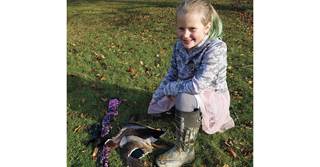
For Laurelai Winslow, her first duck was a cause for celebration, which meant getting dressed up and sharing the story with friends and family.

Randy King had finally convinced his son, Cameron, to go goose hunting. It's not that the 12-year-old was against the idea of hunting. Hardly. He loved hunting rabbits, deer, and doves. "But every time I asked him, 'Hey, we're going to go sit in a muddy ditch for hours and maybe we'll shoot a goosewanna come?'" Randy says, "his reaction was, 'Uh. No.'"
Randy is a blogger, writer, and wild game chef based in Idaho. With three sons, he doesn't give in easily. That's how it came to pass that one morning the convincing worked, and Cameron was lying in a muddy ditch with his dad, grandfather, and a family friend when a pair of geese came in low and quiet, passing overhead, then pulling a 180 to swing right in. "It was a perfect kid shot," Randy recalls. "Twenty-five feet, straight overhead. You couldn't ask for an easier shot on a goose."
In the ditch, Cameron swung a 20-gauge single-shot with an exposed hammer and fired. The goose crumpled. So did Cameron.
"Well," Randy says sheepishly, "I guess I should have mentioned I'd souped up his shells to 3-inch magnums. He wasn't used to that. That was a poor parenting decision." The gun bucked as the goose fell, and the hammer split Cameron's cheek wide open. Cameron was sitting next to his grandfather, who called out, "Randy, he's really cut himself."
"I didn't think much about it," Randy says. "Another fine parenting moment. I said, 'Maybe, but would you look at that goose!'" Then Randy made his way over to Cameron. "When I did get over to him," he recalls, "I could see how deep the cut was. And I thought, oooh, we're talking stitches right there."
Through it all, he says, there was not so much as a whimper from Cameron. The men managed to stop the copious bleeding and then sent Cameron off to his aunt's house across the field while they packed up guns and gear. She'd heard the shot, of course, and then answered the door to see her nephew holding his goose on the porch.
The gash wasn't something that a good flushing with disinfectant and eight stitches couldn't fix. "He was stoked about the stitches," Randy laughs. "It's been three years now, and you can still see the scar when he smiles, like a dimple under one eye. It's one of his proudest possessions." And perhaps one of his father's too.
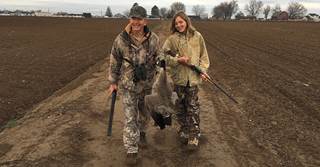
Randy King and his son, Cameron, with Cameron's first goose. The youngster made a perfect shot on the bird and has the scars to prove it.

Two years ago, Nathaniel Welch took Henry, his 12-year-old son, on his first duck hunt. Henry's best friend, Rascal Curry, tagged along. It was the payoff for months of hard work. Nathaniel had helped the pair sign up for hunter safety classes, and the three took an Uber from New York City to Staten Island for the boys' final exam. The young pals pored over YouTube videos to research shotguns and waterfowling techniques. And then, on opening day of the 2019 duck season, the threesome struck out for Great South Bay, behind the Welches's house on Long Island.
In the dark, just before legal shooting light, a pair of mallards dropped into the spread. The boys watched, mesmerized, as the ducks swam around the decoys for nearly five minutes. At times, they were less than 15 feet away. At the strike of legal light, Henry and Rascal stood up in the blind and fired their shotguns. Water exploded, and both ducks flew away unscathed.
"They were beside themselves," Nathaniel confided. "They still are. We hunted another six or seven times that season, but they never got a bird. All year long, Henry thought about those ducks flying off. We talked about it a lot. It stayed with him, month after month."
Then, during the following season's youth hunt, Rascal shot his first goose in a Great South Bay hunting scene right out of a spaghetti western. The trio hadn't yet finished setting the decoys for an afternoon hunt when a lone goose showed up, flying low and heading straight for the hunters. Nathaniel reached into his pocket, pulled out a single shotgun shell, and lobbed it 15 feet to Rascal's outstretched hand. The young man chambered the round and downed the goose. Henry was still putting on his waders.
That was salt in the wound. "He was happy for his friend," Nathaniel says, "but as you can imagine, that wasn't easy on Henry."
It all came together for Henry a few weeks later. Henry and his dad were in the marsh, just the two of them, sitting on buckets behind a driftwood tree, when five buffleheads skittered their way in. Nathaniel says he rarely shoots buffleheads, but he wasn't going to hold his boy back. Henry rose, fired, and rolled his first duck. Later that morning, he added a gadwall and a wigeon to the bag. The duckless monkey was off his back.
But it's not the shooting that Nathaniel remembers most clearly. "What I was most proud of was that he was super pumped about getting those birds home and eating them. There's not much to a bufflehead, but that didn't matter. There wasn't any talk about mounting his first duck. Those birds were headed for the frying pan."
It's hard for a parent to watch a child deal with disappointment, Nathaniel says. But there's one way to know that Henry has come to terms with the ups and downs of waterfowling. "Now, all he talks about," Nathaniel says with a grin, "is next season."
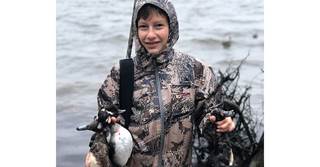
An entire season without any luck, Henry Welch learned some valuable lessons about patience and dedication before finally taking his first ducks.

It wasn't until a mentor began coaching her with a shotgun that Madelyn McFarland realized just how impaired her vision was. She always suffered from poor eyesight, but after a few eye-dominance exercises, it was clear that her point of focus at middle-distance objectssay, a duckwas way off to the left.
"Plus, for some reason, and don't ask me why, I can't wink," she says. "Not being able to close one eye while each of your eyes is fighting the other to see who wins is not a great way to hit what you think you're shooting at."
And it explains why Madelyn struggled to down her first duck.
It had not been for a lack of generous mentors. As an undergraduate student at Louisiana State University, Madelyn studied under Dr. Kevin Ringelman. She participated in wildlife techniques classes in which students received their hunter safety certifications and went on first hunts. She hit the duck woods often, and while she played a part in putting ducks on the water, there was never that one bird that she knew in her heart was hers and hers alone.
"That's what I wanted," she says. "To know without a shadow of a doubt. But not being able to shoot worth a crappardon my languageis a real challenge in a duck blind."
Her persistence gained the respect of her peers. Her coworkers and friends in the Ringelman lab chipped in and bought her a shotgun as a going-away present. Madelyn went to Michigan to work as an intern in DU's Great Lakes/Atlantic office, where she found more mentors, including Dane Cramer, a regional biologist working on DU's Big Rivers Initiative. Since she can't wink, she bought shooting glasses that blocked the vision in her left eye. She practiced and missed and practiced some more. When she left DU for graduate school in Mississippi, her DU coworkers pitched in and gave her a parka and bibs. But she was still duckless.
"It was disappointing," she explains. She felt like she didn't belong to something she desperately wanted to belong to. It seemed like it might never happen, until it did.
Madelyn and her boyfriend were hunting a friend's property outside of Starkville, Mississippi. They'd seen a few geese pile into a pond on the property during earlier scouting trips, so one morning they set up there before daylight. The sun came up, but no geese showed. "So, we wait and wait and nothing," Madelyn recalls. You know how it is, she says. You wait another minute just in case, and then another five minutes just to make sure, and then it's a half-hour after you needed to be gone and there you sit, still hoping.
And then a pair of gadwalls came in so fast that she didn't have time to grab the glasses she had pushed up on her head. There was only time to snatch the gun and settle the stock into her shoulder. She let the hen pass, pushed the muzzle to catch up with the drake, and then pulled the trigger. There was only enough time to do what she had rehearsed a thousand times before, under the care of mentors from the Gulf of Mexico to the shores of the Great Lakes. And the bird fell.
"I knew in that moment that was my duck," she remembers. Her boyfriend didn't shoot. She looked over at him and he had a huge smile on his face. "You did it!" he said. "That was your first duck!"
Madelyn admired the rusty red of the gadwall's wing, so gorgeous in the light. "This sounds cheesy," she says, "but it's the truth. I didn't cry, but I wanted to. Being from south Louisiana, to have that first duck be a gadwall, such an iconic duck, meant a lot to me." She dried that gaddy's wings and pinned them into a shadowbox.
That first duck was her only duck for last season. "But I'm still riding on a high," she says. "Waiting for it all to start again."
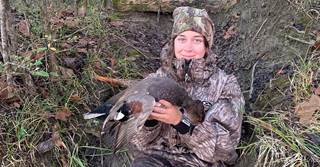
Madelyn MacFarland relied on a number of different mentors to educate her about waterfowling and shooting. To commemorate her first duck, she created a shadowbox with the bird's wings.
Ducks Unlimited uses cookies to enhance your browsing experience, optimize site functionality, analyze traffic, and deliver personalized advertising through third parties. By continuing to use this site, you agree to our use of cookies. View Privacy Policy